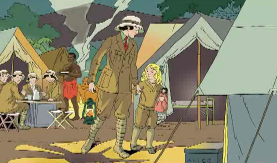(单词翻译:单击)
CAMPING AT NIGHT
晚间露营
The moment the porters got in, they dropped their loads and rushed off to see about getting a sleeping-place in the huts of the village.
搬运工们一进来就放下他们运载的货物,然后冲出去四处查看,在村子的棚屋中找到一个睡觉的地方。
Sometimes the porters would bring back some of the village men to help set up the tents for the white people and to carry the different bags and boxes to the right places.
有时搬运工们会带回来一些村里的男人,帮着白人搭建帐篷,把不同的包裹和箱子摆在合适的地方。
As soon as the cook had his tent up and his fire going, he began getting dinner. Sometimes the dinner was at two o'clock, sometimes at four or at six. When dinner was to be late, the travelers would eat the crackers and chocolate they carried in their pockets, and open a bottle of lime juice, which is the finest-tasting thing in the world on a hot day in Africa.
厨师一搭起帐篷,生起火就开始准备晚餐了。晚餐有时在两点钟,有时在四点钟或六点钟。晚餐太晚时,旅行者们会吃口袋里的咸饼干和巧克力,并打开一瓶酸橙汁,在非洲炎热的日子里,酸橙汁是世界上最美味的东西。
Often the rain would come pouring down just as the meal was ready.
通常,当饭菜准备好时,雨就会倾盆而下。
If it didn't rain too hard, the cook-boys used to dash from the cooking-tent to the dining-tent with the food. The rain did not often last long, and the sun always came out again.
如果雨下得不太大,那些帮厨男孩们端着食物从烹饪帐篷里冲到进餐帐篷里。雨通常持续不了很长时间,雨后太阳又会出来。

The native women from the villages used to bring in food for the porters, and lay it out in rows. The food was usually bananas or meal tied in banana leaves. Then the porters would line up, and each man would take what was opposite him and go off and cook it. Sometimes the white people bought oxen for the porters from a chief who had cattle; and sometimes they fed the porters antelope meat.
村落的土著妇女们通常给搬运工们带来食物,并把它们一排排放好。这些食物通常是香蕉或者裹在香蕉叶子里的饭菜。这时搬运工们就排好队,每个人将他正前方对着的食物拿去烹调。白人们有时会从养牛的首领那里给搬运工们买一头公牛;有时他们给搬运工们买羚羊肉吃。
Before dinner was over Alice was always nodding into her plate, and off she would go with Priscilla to their tent. When the little girl was snuggled down cosily in her blankets, Priscilla would tie the tent flaps shut so that no insect could slip inside, and then go out and join the others in the camp chairs.
晚餐还没吃完,爱丽丝总是困得点头,头快要垂进盘子里了,然后她就和普丽西拉一起离开,回到她们的帐篷里。当小女孩舒服地躺在她的毯子里时,普里西拉会拉上帐篷的门帘,这样就不会有虫子溜进帐篷里了,然后她再出去,加入到坐在露营餐椅上的其他人中。
Alice would fall asleep hearing the murmur of the white people in front of her tent, and farther away, like a humming of bees, the chatter of the porters about their little fires. The porters never seemed to sleep. They would have laughed and talked all night if the white people had let them. That was the fun they got out of the trip.
听着帐篷前大人们的窃窃私语以及远处搬运工们围着他们的小火堆,像蜜蜂一样喋喋不休地唠叨着,爱丽丝睡着了。搬运工们似乎从不睡觉。如果白人允许的话,他们能整晚说笑。那是他们从旅行中得到的乐趣。
They used to shout with laughter over the doings of the white people they were traveling with, over the strange cloths they wore, and the strange way they ate. Alice used to hear the word "Wazungu" (Stranger), followed by laughter and song, until Uncle Akeleys shout, "Pana kilele" (No noise) put an end to the fun-making and made everybody settle down for the night.
黑人们经常会因为白人的行为、怪异的衣着以及奇怪的吃饭方式而大声笑起来。爱丽丝过去常听到“Wazungu”(怪人)一词,接着就是笑声和歌声,直到埃克雷叔叔的一声大喊“Pana kilele”(安静)才会使搞笑的时刻结束,大家都安顿下来过夜。


